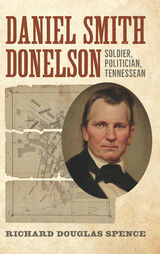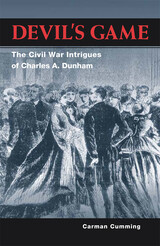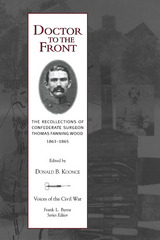4 start with D start with D

Daniel Smith Donelson was the grandson of two of early Middle Tennessee’s most famous founders—John Donelson and Daniel Smith—and nephew of Tennessee’s perhaps most famous soldier statesman, Andrew Jackson. And while Civil War historians are familiar with Donelson because he led a Confederate brigade, his namesake fort in Middle Tennessee, and his importance to the war effort as he transitioned into Confederate war administration, Donelson the significant son of Tennessee has eluded a full study, and no book-length biography has been published, until now.
Unfortunately, Daniel Smith Donelson left no body of papers, which leaves any biographers, as Richard Douglas Spence contends, to approach their subject through a “historical back door” via Donelson’s legendary uncle and his brother, Andrew Jackson Donelson, who enjoyed a significant political career in his own right. Spence’s biography begins with Donelson’s upbringing at the Hermitage after Donelson’s father died when he was three. From there Spence follows Donelson’s career as a planter, militiaman, state congressman, Civil War general, and finally an administrator overseeing the Confederate Department of East Tennessee. Fort Donelson was named in his honor, and his brigades fought at Cheat Mountain, Perryville, and Murfreesboro (Stones River). He was posthumously promoted to major general after dying of disease on April 17, 1863, at the age of sixty-one.
Spence’s approach reveals aspects of Donelson’s life and career that in many ways rival his Civil War record for importance, providing fresh perspectives on Jackson’s tumultuous presidency and the contentious nature of antebellum politics in Tennessee.

The first book-length study of one of the Civil War's most outlandish and mysterious characters
Devil's Game traces the amazing career of Charles A. Dunham, Civil War spy, forger, journalist, and master of dirty tricks. Writing for a variety of New York papers under alternate names, Dunham routinely faked stories, created new identities, and later boldly cast himself to play those roles. He achieved his greatest infamy when he was called to testify in Washington concerning Abraham Lincoln's assassination. Many parts of Dunham's career remain shadowy, but Cumming offers the first detailed tour of Dunham's convoluted, high-stakes, international deceits, including his effort to sell Lincoln on plans for a raid to capture Jefferson Davis.
Exhaustively researched and unprecedented in depth, this carefully crafted assessment of Dunham's motives, personality, and the complex effects of his schemes changes assumptions about covert operations during the Civil War.


The Civil War was a tragic conflict that destroyed many lives, but for those trying to save lives the tragedy was often compounded. Military doctors labored through the smoke of battle where impossible conditions and fear of infection often forced them to resort to amputation, and most operations were performed without painkillers. Thomas Fanning Wood recorded his wartime experiences as a Confederate Army surgeon, and his recollections of those events allow us to hear a distinct voice of the Civil War.
As a young soldier recovering from fever at a Richmond hospital, Wood developed an interest in medicine that was encouraged by a doctor who steered him toward medical training. After only eight months of study he was made an assistant surgeon in the Third North Carolina Regiment. His narrative—drawn from his memoirs, letters from the front, and articles written for his hometown newspaper—presents a poignant and sometimes horrifying picture of what the Civil War physician had to face both under battlefield conditions and in urban hospitals.
Wood himself spent much of his time at the front, and his vivid narrative describes both a doctor’s daily activities and the campaigns he witnessed. He was present at many of the war’s major engagements: he was near Stonewall Jackson when the general fell at Chancellorsville, manned a field dressing station at the foot of Culp’s Hill at Gettysburg, and was one of the few survivors of the Union attack on the "mule shoe" at Spotsylvania when his entire division was wiped out. Wood’s account also lends new insight into Jubal Early’s 1864 campaigns in the Shenandoah Valley and against Washington.
With its observations of medical care and training not found in standard histories of the war—including a description of the examination required to become an assistant surgeon—Doctor to the Front offers a unique human perspective on the Civil War. With their additional descriptions of key figures and events, Wood’s recollections combine historical significance and human interest to show us another side of that terrible conflict.
The Author: Donald B. Koonce is the great-grandson of Thomas Fanning Wood and has served on the Board of Directors of the South Carolina Historical Society and the Historic Greenville Foundation. He is president of the Koonce Group, Inc., an award-winning communications company whose productions include Daybreak at the Cowpens, a documentary for the National Park Service.
READERS
Browse our collection.
PUBLISHERS
See BiblioVault's publisher services.
STUDENT SERVICES
Files for college accessibility offices.
UChicago Accessibility Resources
home | accessibility | search | about | contact us
BiblioVault ® 2001 - 2024
The University of Chicago Press









